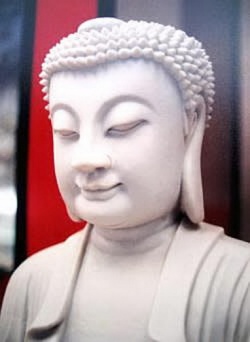The Buddha and the five qualities a Dharma Teacher
Anguttara Nikaya V.159, Udayi Sutra
"[1] The Dharma should be taught with the thought, 'I will speak step-by-step.'
The AWAKENING 101 course is arranged in such a way as to help point the way and ease the Dharma Gate for those who may be so interested. The course is organized into ten rather extensive easy to follow folders that flow, in order, from a general position and explanation of Zen, Enlightement, and Buddhism into more specific areas. As an example, in Folder 6 the topic is Meditation. Everything from a beginning view to those of Nagarjuna to Dogen to what Shikantaza is to an actual online meditation course, is laid out step-by-step and explored. The last folder, Folder 10, ends with a rather extensive suggested reading list. The reading list has many additional click-through reading sources such as online Koans, Sutras, and full-length Zen books as well. (source)
"[2] The Dharma should be taught with the thought, 'I will speak explaining the sequence [of cause & effect].'
This law of Karma, or cause and effect, is so powerful that it governs everything in the universe, that is, according to Buddhism and Zen, except the one who is Enlightened. Upon Enlightenment, the round of cause and effect loses its significance, just as Samsara, or the round of birth and death, ceases with Enlightenment. Since basic nature transcends all duality and is ultimate, there is no one to receive the effect, whether it is good or bad, and no one to whom any effect can apply. Cause and effect, just like birth and death, lose their significance at the Enlightened level because at the level of basic nature there is no one to receive the effect of the Karma, whether it is good or bad. Therefore, at the extreme, when one is Enlightened, the law of Karma is not applicable. All that the Enlightened one does, says, or thinks is through free will, a manifestation of basic nature, and not the effect of past Karma. This unique explanation by Buddha of the nullification of the law of Karma is very important. (source)
"[3] The Dharma should be taught with the thought, 'I will speak out of compassion.'
KARUNA - Compassion - works. It works for us in allowing us to perceive the pain, anguish, affliction, agony, torment and distress of others clearly, through allowing it into our experience also. It is then something that has moved further out of the realm of the ignored or the unconscious into the realm of the included, the accepted, the conscious. Compassion is spacious, allowing the way things are to exist, to change, and to end. Particularly it allows pain to end. This means that it must be patient, not in any hurry to force pain to end or to try officiously to get rid of pain. It is the active side of wisdom and is the Buddha's supreme or GOLDEN PURIFIER. The Buddha's compassion allowed him to realize that there is still something that can be done by a fully enlightened being. It was compassion that motivated him to teach "for the benefit of those with little dust in their eyes". (source)
"[4] The Dharma should be taught with the thought, 'I will speak not for the purpose of material reward.'
Real Masters never charge for their services, nor do they accept payment in any form or any sort of material benefits for their instructions. This is a universal law among Masters, and yet it is an amazing fact that thousands of eager seekers in America and elsewhere go on paying large sums of money for "spiritual instruction." Masters are always self-sustaining. They are never supported by their students or by public charity. (source)
"[5] The Dharma should be taught with the thought, 'I will speak without disparaging myself or others.'
He has no desire for fame. To become anything of a public figure would be deeply distasteful to him; and so it may be that he is satisfied to lead his chosen life and be no more than just himself. He is too modest to set himself up as an example to others; but it may be he thinks that a few uncertain souls, drawn to him like moths to a candle, will be brought in time to share his own glowing belief that ultimate satisfaction can only be found in the life of the spirit, and that by himself following with selflessness and renunciation the path of perfection he will serve as well as if he wrote books or addressed multitudes. (source)

